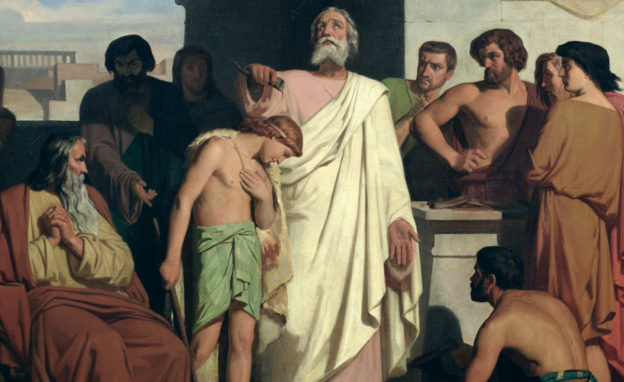David and Goliath is a classic Sunday School story, one which engages kids with its story of a giant killed by a young man. It has become an idiom in our culture of the underdog defeating the giant. It is used as an allegory for how we should slay the giants in our own lives. This use is wrong.
The David and Goliath story is not about us defeating our enemies. It is about God defeating his enemies, looking forward to Jesus defeating sin at the Cross. In the first section of this story, we are introduced to David and Goliath, to the weakness of a king who seeks to act in his own strength, and the faith of a young David who sees the real spiritual battle in play.
In previous chapters, Jonathan’s boldness led to the Philistines’ defeat, and their push back to the coastal plains. But the Philistines were not easily dissuaded, and once again gathered to battle and subdue Israel. Saul and his army were gathered to oppose them, on the territory of Judah (vv.1-3).
A custom in those days was for champions to represent their armies in single combat. It avoided a lot of unnecessary bloodshed, but also reflected a belief that behind duelling armies were duelling deities.
Goliath was the Philistine champion, and he was tall (about 9 foot 6), strong, and nasty (vv.4-7). Goliath taunted the Israelite camp, offering single combat with the defeated champion’s army becoming the other’s slaves (vv.8-10).
Ordinarily, Saul as Israel’s king should have taken up the challenge. Saul himself was tall and strong, which was why Israel had so readily accepted him as king. But here was someone who was taller and stronger. Saul’s strength was no longer enough to carry him. So Saul and all Israel “were dismayed and greatly afraid” (v.11).
In those days, soldiers were provided food and supplies by their families. So David was tasked with bringing food to his three older brothers, who were old enough to be called up to fight (vv.12-15). David himself was not old enough (20; Num. 1:3).
In contrast to Goliath’s strength, David’s lineage and covenantal background are recorded (v.12). David arrives on scene as Goliath has taunted Israel for 40 days, a traditional time of testing (v.16; cf. Matt. 4). David’s dad sent David to the army with food for his brothers, and something for their captain (vv.17-18). He arrived just as the war cry was issued, and went to talk to his brothers just as Goliath strutted out (vv.19-22).
“And David heard him” (v.23). Perhaps for the first time, cursing God. What a shock! And the men of Israel, fleeing and hiding! (v.24) What a sight! Perhaps to justify themselves at David’s presumably shocked and disgusted face, the soldiers point to his size and his defiance of Israel and Saul’s princely prize, since Saul lacked the courage to fight himself (v.25).
David recognised that this was not a mere military conflict, but a true spiritual battle that required a faith-filled response. So he asked who would kill Goliath and take “away the reproach from Israel? For who is this uncircumcised Philistine, that he should defy the armies of the living God?” (v.26).
How dare Goliath challenge God like this? Something had to be done. “Yes” they responded, someone should do something and claim the prize (v.27).
For Eliab, it was too much. He challenged David’s motives, suggesting a heart thirsty for bloodsport led him to speak (v.28). David pointed out he had only spoken about what should be done, and turned to others to try and convince them of the need to fight (vv.29-30).
There is more to the story, but we should pause here and notice a few things. Firstly, Goliath is clearly set up as a living picture of sin and demonic opposition to God. He represents the evil spiritual forces that oppose God’s People. Not our own doubts or schoolyard bullies.
Secondly, Saul relied on his own strength. He met his match. There is always someone smarter, stronger, or more talented. We cannot rely on our own strength in taking on God’s enemies. Like Saul and Israel, we will eventually cower and fear.
Instead, we must see all of life for the true spiritual battle it is, as David did. Only when we recognise we cannot win in our own strength, and rely on God through Christ and the Holy Spirit active in our lives to provide the victory will we overcome.
Like David, if we trust in God and recognise every assault of sin as a rebellion against God, it empowers us to stand firm and resist temptation, whether internal or external from the world.
As we do so, we must rely on God’s strength ultimately shown in Jesus, David’s greater son who has already conquered sin and death at the Cross. In Christ’s strength, wearing God’s armour, we will prevail against those who oppose God, in the real spiritual battle that rages still today.


